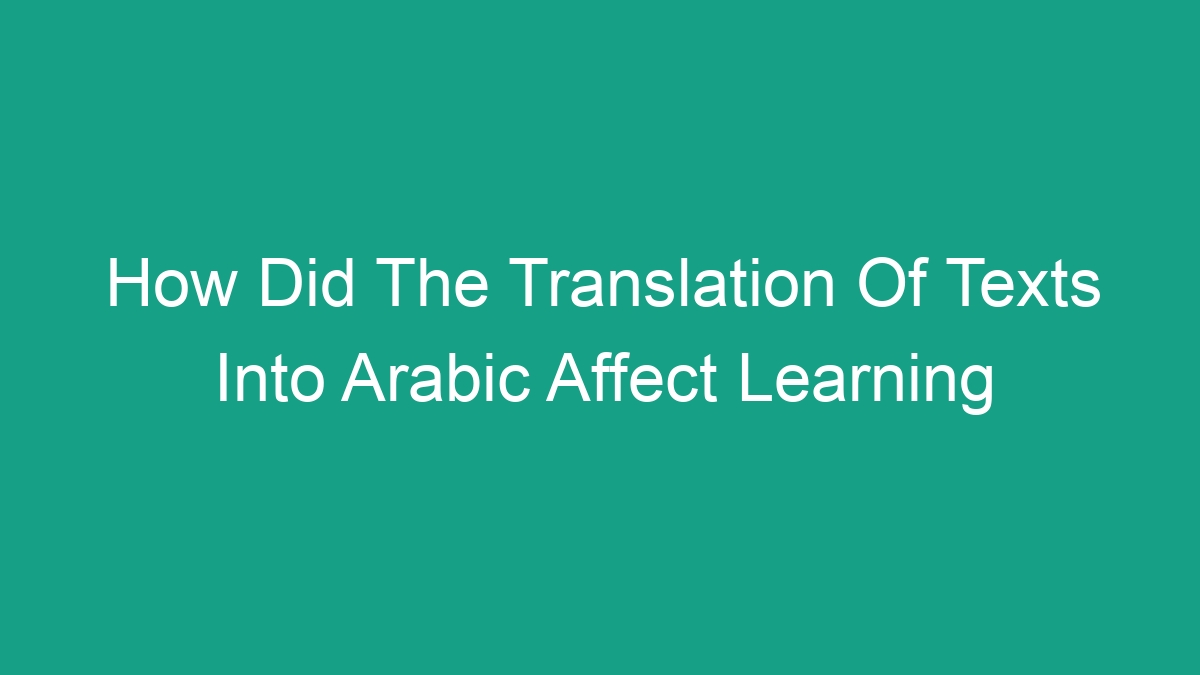
When it comes to the history of education and learning, the translation of texts into Arabic played a significant role in the advancement of knowledge. From science and mathematics to philosophy and literature, the translation movement in the Islamic Golden Age had a profound impact on shaping the intellectual landscape of the world. In this article, we will explore the ways in which the translation of texts into Arabic affected learning and knowledge dissemination.
The Translation Movement in the Islamic Golden Age
The Islamic Golden Age, which lasted from the 8th to the 14th century, witnessed a remarkable translation movement that brought knowledge from various parts of the world into the Islamic territories. During this time, scholars and translators in the Islamic world translated the works of ancient Greek, Persian, Indian, and Roman scholars into Arabic, making these texts accessible to a much wider audience. This endeavor not only preserved the knowledge of ancient civilizations but also catalyzed new developments in various fields.
The Impact on Science and Mathematics
Translation of Texts into Arabic played a crucial role in the advancement of science and mathematics. Greek texts, such as those by Euclid, Ptolemy, and Aristotle, were translated into Arabic, leading to the assimilation of Greek scientific and mathematical knowledge into the Islamic world. This transfer of knowledge spurred significant advancements in fields such as astronomy, medicine, and algebra, with scholars like Al-Kindi, Al-Battani, and Al-Khwarizmi making substantial contributions to these disciplines.
Table 1: Key Figures in Islamic Science and Mathematics
| Scholar | Contributions |
|---|---|
| Al-Kindi | Contributions to optics, pharmacology, and mathematics |
| Al-Battani | Advancements in astronomy and mathematics |
| Al-Khwarizmi | Pioneering work in algebra and algorithm development |
The Influence on Philosophy and Literature
In addition to scientific and mathematical texts, the translation movement also had a profound impact on the development of philosophy and literature in the Islamic world. The works of Greek philosophers such as Plato and Aristotle were translated into Arabic, leading to the integration of Greek philosophical thought into Islamic philosophy. This fusion of ideas laid the groundwork for the development of Islamic philosophy, with scholars like Al-Farabi and Ibn Sina building upon the translated works to formulate their own philosophical theories.
Furthermore, the translation of literary works from Greek, Persian, and Indian traditions into Arabic enriched the literary landscape of the Islamic world, broadening the literary horizons of Arabic-speaking societies and contributing to the flourishing of poetry, prose, and storytelling.
The Dissemination of Knowledge
The translation of texts into Arabic facilitated the dissemination of knowledge across cultures and regions. As Arabic became the language of scholarship in the Islamic world, the translated texts served as a bridge between different intellectual traditions, allowing for the exchange of ideas and the enrichment of scholarly discourse. Additionally, the translated works were instrumental in influencing later Western European Renaissance thinkers, as many of these Arabic translations made their way to Europe and formed the basis for the revival of classical learning.
Legacy and Continued Relevance
The impact of the translation movement in the Islamic Golden Age continues to be felt in the present day. The contributions of Islamic scholars and translators have left a lasting legacy that has shaped the trajectory of human knowledge and understanding. The translated texts not only preserved the wisdom of ancient civilizations but also sparked intellectual innovation and cross-cultural dialogue, laying the groundwork for the development of diverse fields of knowledge.
Furthermore, the translation movement serves as a testament to the power of language in facilitating the exchange of ideas and the advancement of learning. It highlights the role of translators as cultural mediators, who bridge linguistic and intellectual divides, enabling the transmission of knowledge across time and space.
Conclusion
In conclusion, the translation of texts into Arabic had a profound and far-reaching impact on learning and knowledge dissemination. From science and mathematics to philosophy and literature, the translation movement in the Islamic Golden Age played a pivotal role in shaping the intellectual landscape of the world. The legacy of this movement continues to resonate today, underscoring the enduring significance of translation in the progress of human knowledge.



